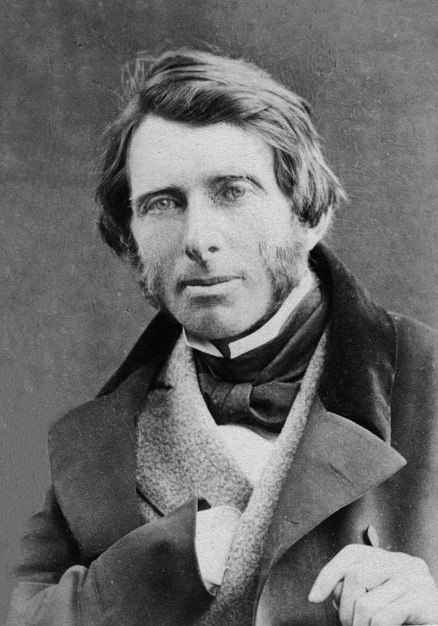Джон Рёскин знаменитые цитаты
Джон Рёскин Цитаты о мужчинах
Джон Рёскин Цитаты о силе
живопись
Источник: Искусство и действительность
архитектура
Источник: Семь светочей архитектуры
Джон Рёскин цитаты
„Больше всего я любил рыть ямы, форма садоводства, которая — увы! — не встречала одобрения матери.“
яма
Источник: Избранные мысли Джона Рёскина
орёл
Источник: Семь светочей архитектуры
дворец
Источник: Камни Венеции
мрамор
Источник: Камни Венеции
архитектура
Источник: Камни Венеции
Источник: Ричард Докинз, «Бог как иллюзия» (2006) // пер. с англ. Н. Смелковой. — М: КоЛибри (Иностранка), 2008. — гл. 4.
мысли, дерево
Источник: Искусство и действительность
художник
Источник: Искусство и действительность
мрамор
Источник: Камни Венеции
Джон Рёскин: Цитаты на английском языке
Also misattributed to John Steinbeck.
Источник: The Works of John Ruskin: The stones of Venice, v. 1-3
“When love and skill work together, expect a masterpiece.”
Widely attributed on the Internet to John Ruskin; see this Google search https://www.google.com/search?num=50&q=%2B%22When+love+and+skill+work+together%2C+expect+a+masterpiece.%22+%2B%22John+Ruskin%22+-%22Charles+Reade%22&oq=%2B%22When+love+and+skill+work+together%2C+expect+a+masterpiece.%22+%2B%22John+Ruskin%22+-%22Charles+Reade%22&gs_l=serp.12...143064.148395.0.150598.2.2.0.0.0.0.108.196.1j1.2.0....0...1c.1.64.serp..0.0.0.JURsIFvRl34 for thousands of pages containing the quote AND "John Ruskin" but NOT "Charles Reade".
This is actually from Put Yourself in His Place by Charles Reade.
Misattributed
“There is no wealth but life.”
Источник: The King of the Golden River
A Joy for Ever, note 6 (1857).
Контексте: For certainly it is excellent discipline for an author to feel that he must say all he has to say in the fewest possible words, or his reader is sure to skip them; and in the plainest possible words, or his reader will certainly misunderstand them.
Volume I, chapter II, section 17.
The Stones of Venice (1853)
Вариант: Remember that the most beautiful things in the world are the most useless.
Контексте: You were made for enjoyment, and the world was filled with things which you will enjoy, unless you are too proud to be pleased with them, or too grasping to care for what you cannot turn to other account than mere delight. Remember that the most beautiful things in the world are the most useless: peacocks and lilies, for instance.
According to Ruskin scholar George P. Landow, there is no evidence that this quotation or its variants can be found in any of Ruskin's works.
[Landow, George P., A Ruskin Quotation?, VictorianWeb.org, 2007-07-27, http://www.victorianweb.org/authors/ruskin/quotation.html, 2013-01-07]
Disputed
Volume III, part V, chapter II (1856).
Modern Painters (1843-1860)
Источник: Dictionary of Burning Words of Brilliant Writers (1895), P. 170.
The Work of Iron, in Nature, Art, and Policy http://books.google.com/books?id=uYEM0Sd18DsC&q="you+may+either+win+your+peace+or+buy+it%22+%22win+it+by+resistance+to+evil%22+%22buy+it+by+compromise+with+evil"&pg=PA196#v=onepage Lecture at Tunbridge Wells (February 16, 1858).
Источник: Dictionary of Burning Words of Brilliant Writers (1895), P. 147.
“When we build, let us think that we build for ever.”
Источник: The Seven Lamps of Architecture (1849), Chapter VI: The Lamp of Memory, section 10.
Источник: The Seven Lamps of Architecture (1849), Chapter II: The Lamp of Truth, section 1.
“Of human work none but what is bad can be perfect in its own bad way.”
Volume II, chapter VI, section 24 http://books.google.com/books?id=AwICAAAAYAAJ&q=%22Of+human+work+none+but+what+is+bad+can+be+perfect+in+its+own+bad+way%22&pg=PA189#v=onepage.
The Stones of Venice (1853)
“Of all God's gifts to the sight of man, colour is the holiest, the most divine, the most solemn.”
Volume II, chapter V, section 30.
The Stones of Venice (1853)
Volume II, chapter IV, section 103.
The Stones of Venice (1853)
Sesame and Lilies, lecture II: Lilies http://www.fullbooks.com/Sesame-and-Lilies3.html
Volume III, part IV, chapter XII (1856).
Modern Painters (1843-1860)
Вариант: All violent feelings have the same effect. They produce in us a falseness in all our impressions of external things, which I would generally characterize as the pathetic fallacy.
